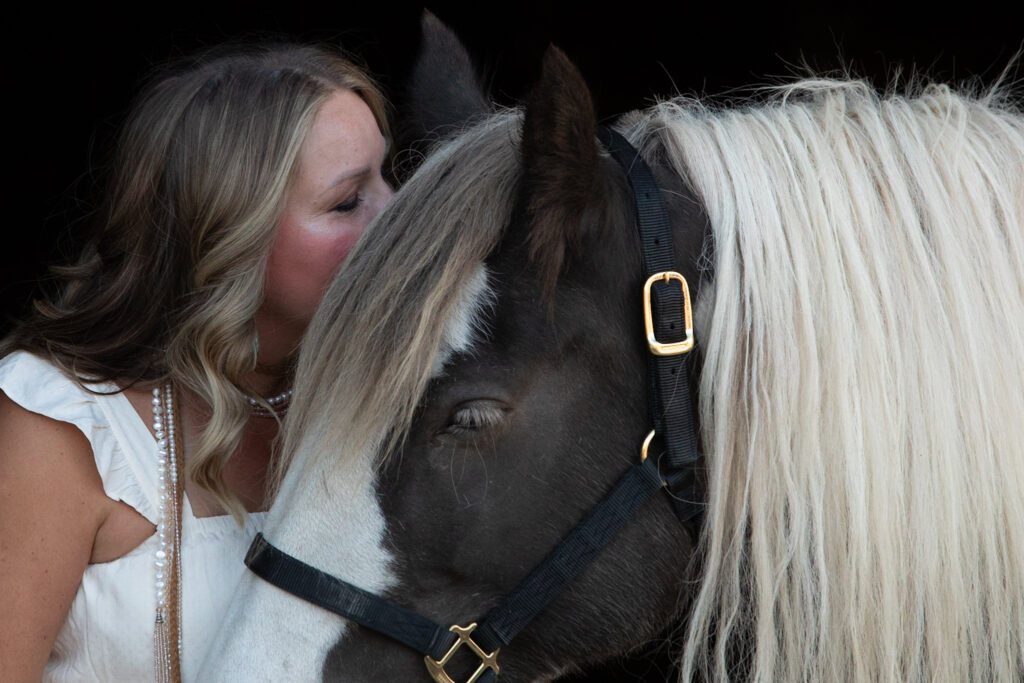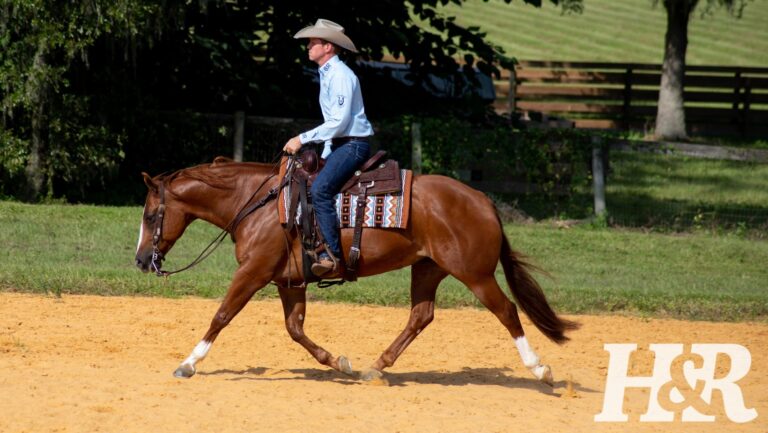This article is part of our Mental Health Awareness Month brought to you by Touched By a Horse.
Do you ever feel like your horse just knows that you’re in a bad mood? Next time you go to the barn in a bad mood, be observant of how your horse reacts to you. Horses have a remarkable ability to not only recognize human emotions but also reflect and respond to them. This creates a unique emotional connection between humans and these magnificent animals. Research has shown that horses can recognize human emotions and react to the emotional states of humans. This ability allows horses to serve as mirrors, reflecting the emotions and intentions of those around them. Your horse isn’t just your teammate and companion. He’s a mirror into your emotions and feelings that can reflect back your current emotional state.

Horses exhibit relaxation as a response to calming and reassuring emotional cues from humans. This can be observed through behaviors such as softening of facial expressions, lowered head carriage, gentle swaying movements, and a general sense of ease and tranquility in their demeanor. Photo courtesy of Touched By a Horse.
Soaking it Up Like a Sponge
One intriguing aspect of the emotional connection between horses and humans is that horses are often described as “emotional sponges.” They have been observed to react strongly and rapidly to human emotions. They effectively absorbe and mirror the emotional states of the people around them. This phenomenon highlights the deep emotional sensitivity and responsiveness of horses, positioning them as intuitive companions capable of providing valuable insights into human emotions.
Reacting to Emotion
Along with soaking up your emotions, your horse might end up reflecting them back at you. Some horses may act more as a mirror in the sense that when you feel nervous, your horse may begin to express nervous behaviors such as pawing or work at a faster pace. What other horses are capable of doing is absorbing your energy—like a sponge. This will usually occur when you’re feeling sadness or grief. You might notice you feel better after time spent around your horse. This is because he is acting like a sponge and taking away your pain.
You might have also noticed that when you become nervous or anxious, your horse usually responds in kind. In the presence of negative emotions such as anger or fear, horses may become tense, agitated, or exhibit avoidance behaviors, reflecting the negative emotional atmosphere. Or, if you are calm and soothing, your horse will most likely absorb that energy and reflect it back to you. Changes in alertness serve as an indicator of a horse’s responsiveness to human emotions. When attuned to heightened emotional states, horses may display increased vigilance, attentiveness, and curiosity. This showcases their ability to detect shifts in the emotional environment and adapt their level of awareness accordingly.
Being aware and cognizant of your mood when you head to the barn can set the stage for a successful riding session. Or, if you’re in a bad mood it might be a good idea to just spend time with your horse and let him soothe your spirit.
Emotional Contagion
Research has shown that horses are prone to emotional contagion. This means they can “catch” and reflect the emotional state of nearby humans. If an individual is experiencing stress or anxiety, a horse may display similar signs of distress or restlessness in response. This is why it is important to start and end your training sessions in the right headspace. In the presence of positive human emotions, horses may demonstrate gestures of affection and connection. This can look like nuzzling, leaning into contact, or gently resting their head against an individual. These gestures symbolize their emotional attunement and their capacity to reciprocate positive emotions.
Equine Therapy
You often hear stories of people experiencing pain or suffering that find healing through horses. The ability of horses to reflect human emotions has led to the development of equine-assisted therapy and interventions. These therapeutic approaches take the emotional sensitivity and mirroring capabilities of horses and apply them to help individuals explore and process their emotions. Through interactions with horses, individuals can gain a deeper understanding of their emotional patterns, communication styles, and behavioral tendencies, fostering personal growth and emotional well-being.
A Deep Connection
The profound emotional connection between horses and humans is rooted in the ability of horses to mirror and respond to human emotions. Their intuitive nature and emotional sensitivity allow them to provide meaningful with the individuals they interact with. Whether in therapeutic settings, equestrian activities, or everyday interactions, horses serve as reflective mirrors, offering valuable feedback and enhancing our understanding of our own emotions.
We can experience this in our everyday lives with horses. However, if you’ve experienced trauma or are having a hard time managing your emotions, you might consider an Equine Gestalt Coaching Method® coach. These coaches will connect you with their horse and work through an experiential session that will enable you to become aware of emotional blockages and unfinished business that might be holding you back in life. Your horse is more than a mirror to your soul, they can help heal it. To learn more about Touched by a Horse® and the Equine Gestaltist™ and Equine Facilitator™ programs or to find a practitioner in your area find a practitioner in your area click here.






